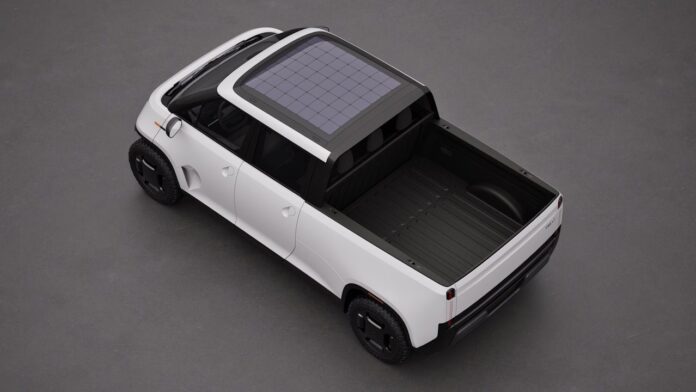Californian electric carmakers Aptera Motors and Telo Trucks have announced a partnership to introduce integrated solar panel options for the Telo MT1, billed as the world’s most efficient EV pickup.
The two carmakers, both based in California and both aiming to reinvent electrified driving, announced late last week that they would partner to provide up to three solar panel kits for the Telo MT1.
Telo, which was founded in 2022, designed the MT1 to be the world’s most efficient electric vehicle (EV) pickup – or a ute, as it would be called in Australia. Built, according to the company, with “Toyota Tacoma capability, Tesla-like range and efficiency, in the footprint of a MINI Cooper”, Telo believes its MT1 is “the most compact, practical, and technically advanced truck” on the market.
Unveiled in mid-2023, the MT1 is intended to utilise Telo’s patent-pending battery packs, optimised for space and delivering up to 560 kilometres in range. With a 1.5-metre-long truck bed in a 3.86-metre-long vehicle, the MT1 is designed to provide the capacity and storage dimensions of a standard ute, but in a size more suited for small city streets and tight parking.
Since the MT1 was unveiled, Telo has received over 4,550 pre-orders. Available for pre-order only in the United States, the base price for the MT1 originally sat at $US49,999, but when the company configurator last month, the price had dropped to $US41,520 ($A66,900, converted). And, with the $US7,500 federal tax credit for eligible buyers, the potential cost drops to only $US34,020 ($A54,800, converted).
Telo Trucks’ newly announced partnership with Aptera will make use of the latter’s integrated solar technology, which it is pairing with the low-drag aerodynamics of its own EV. Known only as the Launch Edition, Aptera’s flagship vehicle offers up to 643 kilometres per charge plus the ability to travel up to 64 kilometres a day on solar.
Aptera’s solar panels are capable of generating up to 200 watts each at peak sunlight, delivering between 1 to 2 kWh per day, based on location and season.
Given that Telo’s MT1 consumes only 200 to 300Wh per mile, integrated solar panels would deliver significant energy reduction and greatly extend the range of the car.
“Our unique curved solar cell design makes it the perfect application to propel automotive utility further than ever before,” said Steve Fambro, co-founder and co-CEO of Aptera.
“Together with TELO, we’re harnessing the power of the sun to make life off the grid a reality for everyone by putting the sun to work for them.”
When the solar panel options are available later this year, those looking to purchase the MT1 will be able to tailor the MT1 with their desired solar configuration during pre-order.
The available solar panel options will include
— Rooftop Truck Cab Solar Panelling – integrating panels over the cab to maximise daily energy generation;
— Tonneau Truck Bed Cover Solar Paneling – a solar-equipped bed-cover that adds power while preserving storage versatility; and
— Camper Shell Solar Paneling – panels that extend from the cab over the bed to increase charging capacity and storage options.
“Whether buyers are looking for a commuter vehicle, a safer, more sustainable option to serve their family’s needs, a rugged, dependable pickup truck for outdoor adventuring, or a highly functional fleet & vehicle that increases their business’s efficiency, Telo continues to be a first-in-class automotive option to satisfy the many needs of carbuyers,” said Jason Marks, CEO and co-founder of Telo Trucks.
Joshua S. Hill is a Melbourne-based journalist who has been writing about climate change, clean technology, and electric vehicles for over 15 years. He has been reporting on electric vehicles and clean technologies for Renew Economy and The Driven since 2012. His preferred mode of transport is his feet.


